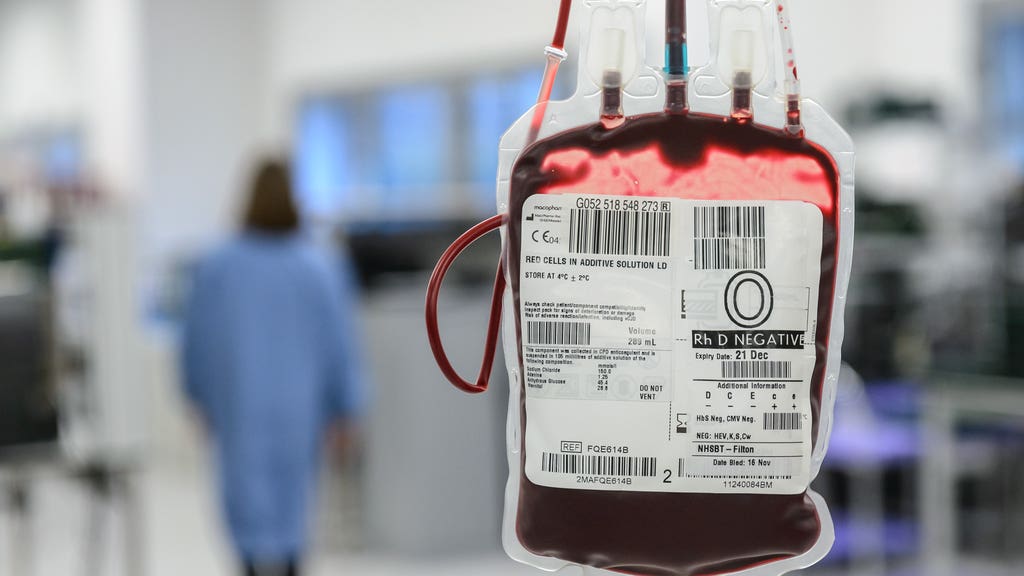
A new “life-changing” treatment has been rolled out to sickle cell patients through the NHS which will benefit thousands of people living with the illness.
The new treatment, crizanlizumab, will reduce chronic pain and trips to A&E while improving patients’ quality of life, healthcare providers have said.
Loury Mooruth, 62, from Walsall in the West Midlands, is one of the first people to receive the drug at Birmingham NHS Trust – the first new treatment for the disease in over two decades.
“Sickle cell has been part of my entire life. People look at you and think you look fine, but they don’t understand the pain and the trauma along with the many trips to A&E,” Ms Mooruth said following her first treatment.
“When I have a sickle cell crisis, it’s like someone has a knife and they are ripping it through my joints – particularly my hips and legs.
“Whenever I thought about having this new drug it brought tears to my eyes. I am so excited and over the moon because it is literally lifechanging for me and my family. I really want to encourage other eligible people with this disease to come forward and get this drug”.
Crizanlizumab, delivered by a transfusion drip, works by binding to a protein in the blood cells to prevent the restriction of blood and oxygen supply that leads to a sickle cell crisis.
People aged over 16 who suffer from multiple sickle cell crises every year will be eligible for the treatment.
According to the NHS, as many as 5,000 people will be treated over the next three years as a result of this deal – much earlier than would have otherwise been possible.
Sickle cell disease - which mainly affects Black people - is a serious and lifelong health condition causing severe pain and organ failure often requiring hospital admissions. Living with this condition can make it difficult for many patients to continue in their jobs or other everyday activities.
Sandwell and West Birmingham Hospitals NHS Trust, is one of the 10 new dedicated centres to treat sickle cell disease across the country. Patients will be able to access the new treatment through their consultant at one of these clinics regardless of where they live in the country.
Dr Bola Owolabi, NHS Director of Health Inequalities, who also works as a GP in the Midlands, said: “It’s fantastic that our first NHS patients have been given this ground-breaking and historic new treatment for sickle cell disease – the first in over two decades. Thanks to the NHS’ deal for this treatment we have been able to provide the latest and best possible treatments for patients at a price that is affordable for taxpayers”.
Chair of the Sickle Cell Society, Kye Gbangbola MBA said: “We are delighted to see the first sickle cell patients are now getting access to this life-changing new treatment. We encourage others that are eligible to do similar. We hope that this new treatment will bring a new lease of life to many living with sickle cell.
“Sickle cell is an underserved and underrecognized condition, so it is great to see new treatments being made available after over 20 years. We hope that this will be the first of many new treatments being made available to improve the lives of those living with sickle cell”.
This new treatment will initially only be made available to around 300 patients but will be extended to 450 in future years after the decision by the National Institute for Health and Care Excellence (Nice), which recommended the drug be available on the NHS.
Nice said it could not recommend the drug for routine use yet due to high uncertainty about the long-term effectiveness of the treatment and its associated costs.
The agreement with the NHS will allow patients to access the drug while extra data is collected through clinical trials.

When this “revolutionary” medicine deal was announced in October, sickle cell patient Adeola Omoyele, aged 28, from London, told The Independent from her hospital bed: “It’s a Catch-22 situation. It’s good that at least some people, at least, will have the extra treatment.
“But it’s quite sad that it’s been 20 years since a new treatment drug for sickle cell and now only a few people will benefit from it. More needs to be done for the benefit of all.”
The following month, in November, a groundbreaking parliamentary report entitled No One’s Listening, jointly published on Monday by the All-Party Parliamentary Group (APPG) on Sickle Cell and Thalassaemia and the Sickle Cell Society, highlighted that sickle cell patients are grappling with racism in the NHS that is placing their lives at risk.
This came afterThe Independent reported that campaigners warned that sickle cell patients are being “ignored because they’re Black”.







